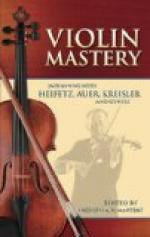“Technic, in the case of the more advanced violinist, should not have a place in the foreground of his consciousness. I heard Rubinstein play when a boy—what did his false notes amount to compared with his wonderful manner of disclosing the spirit of the things he played! Plante, the Parisian pianist, a kind of keyboard cyclone, once expressed the idea admirably to an English society lady. She had told him he was a greater pianist than Rubinstein, because the latter played so many wrong notes. ‘Ah, Madame,’ answered Plante, ’I would rather be able to play Rubinstein’s wrong notes than all my own correct ones.’ A violinist’s natural manner of playing is the one he should cultivate; since it is individual, it really represents him. And a teacher or a colleague of greater fame does him no kindness if he encourages him to distrust his own powers by too good naturedly ‘showing’ him how to do this, that or the other. I mean, when the student can work out his problem himself at the expense of a little initiative.
“When I was younger I once had to play Bach’s G minor fugue at a concert in Brussels. I was living at Ysaye’s home, and since I had never played the composition in public before, I began to worry about its interpretation. So I asked Ysaye (thinking he would simply show me), ‘How ought I to play this fugue?’ The Master reflected a moment and then dashed my hopes by answering: ’Tu m’embetes!’ (You bore me!) ’This fugue should be played well, that’s all!’ At first I was angry, but thinking it over, I realized that if he had shown me, I would have played it just as he did; while what he wanted me to do was to work out my own version, and depend on my own initiative—which I did, for I had no choice. It is by means of concentration on the higher, the interpretative phases of one’s Art that the technical side takes its proper, secondary place. Technic does not exist for me in the sense of a certain quantity of mechanical work which I must do. I find it out of the question to do absolutely mechanical technical work of any length of time. In realizing the three essentials of good violin playing which I have already mentioned, Ysaye and Sarasate are my ideals.
SARASATE
“All really good violinists are good artists. Sarasate, whom I knew so intimately and remember so well, was a pupil of Alard (my father’s teacher). He literally sang on the violin, like a nightingale. His purity of intonation was remarkable; and his technical facility was the most extraordinary that I have ever seen. He handled his bow with unbelievable skill. And when he played, the unassuming grace of his movements won the hearts of his audiences and increased the enthusiasm awakened by his tremendous talent.




